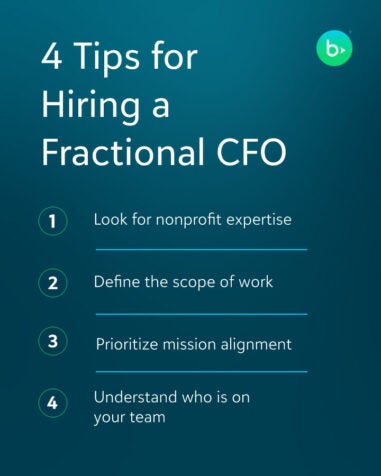Hiring a Fractional CFO for Nonprofits: What Your Organization Should Consider

Nonprofit leaders often grapple with achieving their mission while maintaining financial stability. Limited budgets, complex grant requirements, and fluctuating revenue streams can make managing finances a significant challenge. For many small to medium nonprofits, hiring a full-time Chief Financial Officer (CFO) may feel out of reach.
This is where a fractional CFO nonprofit solution can be a game-changer. A fractional CFO provides senior-level financial expertise on a part-time or project basis, helping nonprofits navigate their financial landscape without the expense of a full-time hire.
Could this be the solution your nonprofit needs? We talked with three experts—Stephanie Skryzowski with 100 Degrees Consulting, Andrew Horrow with Finnovate for Good, and Jerilyn Dressler with Your Part-Time Controller, LLC (YPTC)—to understand more. Here is what they shared about the benefits, potential drawbacks, and tips for hiring the right fractional CFO for your organization.
Benefits of Hiring a Fractional CFO for Nonprofits
Bringing on a fractional CFO can offer nonprofits a variety of advantages, especially during periods of growth, transition, or financial complexity. Here are the key benefits to consider:
1. Strategic guidance for key growth phases
A fractional CFO provides high-level financial leadership that helps nonprofits make informed strategic decisions. As Stephanie Skryzowski explained, “a fractional CFO can help nonprofit leaders make sense of the numbers to make smart, strategic decisions that move the mission forward, including cash flow, budgeting, and reporting to funders and the board with confidence. They can be a thought partner to the executive team, helping see around the corner and build a stronger financial foundation to sustain and scale your impact.”
This type of guidance is particularly valuable for nonprofits facing transitions, such as leadership changes or scaling operations.
2. Cost-effectiveness
Nonprofits often operate on tight budgets, and hiring a fractional CFO allows you to access senior-level expertise without the full-time salary and benefits associated with an in-house CFO. “A fractional CFO is lower cost because they aren’t working 40 hours a week for your organization, and there’s no need to pay taxes or benefits. This is especially helpful for nonprofits that may not yet have the resources to hire someone full-time,” said Andrew Horrow.
3. Flexibility and scalability
Unlike a traditional CFO, a fractional CFO can scale their services to meet your organization’s changing needs. According to YPTC, you can scale your fractional CFO services up or down depending on your nonprofit’s current needs or budget constraints, allowing for flexibility that hiring a full-time team member doesn’t offer. Whether you need assistance with a specific project or ongoing support, a fractional CFO can adjust their role to suit your requirements.
4. Access to specialized expertise
Fractional CFOs bring years of experience working with multiple organizations, which means they’ve seen a broad range of financial challenges and solutions. “Consultants have seen multiple use cases as opposed to a CFO who might have been at two or three other organizations prior to joining yours,” Andrew said. This expertise can be especially beneficial for nonprofits that need help in specific areas like grant compliance or diversified revenue strategies.
Why a Fractional CFO Might Not Be the Right Choice for Your Nonprofit
While fractional CFOs offer flexibility and expertise, they’re not the perfect fit for every organization. Here are some scenarios where they might fall short:
1. The need for daily financial oversight
If your nonprofit requires constant financial management or has a high volume of daily transactions, a fractional CFO may not provide the hands-on support you need. Stephanie advised that very large and complex organizations often benefit from having someone in-house who is dedicated full-time to their organization.
2. Organizational structure challenges
Some nonprofits may have specific structures that make onboarding a fractional CFO difficult. For instance, if your team lacks lower-level accounting staff to handle day-to-day tasks, the fractional CFO may spend time on duties better suited for a controller. Andrew emphasized the importance of having an established in-house team. “On-site staff need to make day-to-day decisions, and without a strong accounting presence, a fractional CFO might not be able to focus solely on high-level work,” he said.
3. Potential costs for smaller nonprofits
While fractional CFOs are often more affordable than full-time hires, smaller nonprofits may still find the cost challenging. For organizations on very tight budgets, even part-time services might strain financial resources. Start with a strong internal finance team who can handle day-to-day tasks, and work to grow your staff internally with the help of leadership and your board.
When Would a Full-Time CFO Be a Better Option?
In some cases, a full-time CFO is a better choice to ensure financial stability and strategic growth. Consider hiring a full-time CFO under the following circumstances:
You have extensive in-house experience
If your organization has a knowledgeable controller or member of your finance team ready to step into a more strategic role, transitioning to a full-time CFO may make sense. There would be less down-time for onboarding, and you can ramp up duties based on your needs and budget, and their capacity.
You have a need for consistent oversight
Funding changes or managing multiple revenue streams often requires daily financial oversight. A full-time CFO can provide the consistency and immediate availability that these scenarios demand.
You are still building a data-driven accounting culture
If your nonprofit lacks established accounting processes or a culture of trust in financial data, a full-time CFO can help lay the groundwork for strong financial management.

Tips for Hiring a Fractional CFO
If you’ve determined that a fractional CFO is right for your nonprofit, following these tips can help ensure a successful partnership:
1. Look for nonprofit expertise
Nonprofit accounting is distinct from corporate finance, and it’s crucial to find a fractional CFO with experience in the sector. “Look for someone who truly understands the nonprofit sector, including restricted funding, grant compliance, and how to communicate financials to non-finance stakeholders,” Stephanie said. Get references from organizations who are a similar size and using the same fund accounting system, if you can.
2. Define the scope of work
Clearly outlining the fractional CFO’s responsibilities will help avoid confusion and ensure alignment with your organization’s needs. “Be clear in the contract about what is included and what isn’t. Define expectations for management, the board, and staff, including results and processes,” Andrew suggested.
3. Prioritize mission alignment
Finding a fractional CFO who aligns with your nonprofit’s mission and values is critical. YPTC recommends that anyone who works for your organization should fully understand and believe in your mission, so they’re motivated to put their best foot forward.
4. Understand who is on your team
If you work with an agency that provides fractional CFO services, know who will be working on your account. Make sure there is a personality fit with your organization and your team—and an escalation point if you aren’t getting what you need, Andrew said. Including your team in the hiring process can also help ensure a good cultural fit.
Improve Your Financial Strategy with a Modern CFO
The CFO role has evolved from the traditional back-office finance manager to a dynamic leader steering nonprofits towards their social impact objectives. You need someone on your team who can help you innovate while still managing risk. You need a CFO who can collaborate across the organization, so they understand how everyone’s needs come together—and help prioritize them with leadership.
If you’re ready to take the next step by bringing on a CFO—fractionally or full-time—check out our Guide to Hiring a Modern CFO for Your Nonprofit for expert advice and actionable tips.



